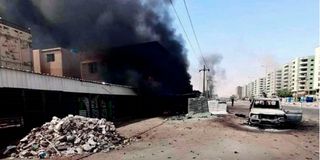Sudan women renew calls for peace as war rages

Smoke rises from a building next to a damaged car on a street in Khartoum, Sudan. Gender and human rights activists have raised the red flag over the skyrocketing number of women and girls experiencing sexual violence due to the ongoing war in the country.
What you need to know:
- Unicef estimates that at least 435 children have been killed in the war. Women and girls have been left struggling to access lifesaving reproductive health and protection services.
- About 80 per cent of hospitals in areas affected by conflict are out of action. In Khartoum, Darfur and Kordofan, less than one third of health facilities are fully functional.
Sudanese women are demanding an end to the war that has been on in their country for the past eight months.
Under the Peace for Sudan Platform, they say women continue to suffer sexual violence and it is becoming difficult to support survivors. They now want to be included in peace negotiation committees formed to help in finding a peaceful resolution to the conflict.
Since fighting between the Sudanese Armed Forces and the Rapid Support Forces broke out on April 15, 2023, hundreds of people have been killed and thousands of others injured.
According to UN reports, gender-based violence (GBV) has increased during the conflict, and the humanitarian situation has significantly worsened, with food prices peaking amidst limited access to water and electricity.
Women and girls have been the greatest casualties, with thousands of them being raped, defiled or abused.
“We must work together to formulate a clear vision to achieve the aspirations of the Sudanese people, bringing back security, peace, and the establishment of a civil state where all citizens are equal, and opportunities are provided regardless of their gender, ethnic, religious or tribal backgrounds,” said Samia Argawi, founder of Women Against War and member of the Peace for Sudan Platform.
The Peace for Sudan Platform is an initiative by Sudanese women-led organisations supported by UN Women. It comprises more than 49 women-led peace initiatives, humanitarian initiatives, and civil society organisations, featuring representatives from different parts of the country.
Conference
The women spoke during a conference in Kampala, Uganda. The conference was organised by UN Women in partnership with the Intergovernmental Authority on Development (Igad), the African Union, and the International Women's Peace Center.
It included consultations with more than 400 women across 14 Sudanese states about their priorities and demands aimed at building bridges between women in Sudan and those in countries across the region.
They attended online and in-person, including many refugees and those in exile. The conference also sought to enhance women's leadership and highlight the leading role Sudanese women are playing in mobilising the peace movement.
“Sudanese women have their own narrative of resilience and determination as agents of peace. Conflict and displacement have never shaken their mission for peace, as we witness this gathering today and recognise all the women-led peace initiatives and responses on the ground and in other parts of the world,” said Adjaratou Ndiaye, UN Women’s Sudan representative.
Speaking on the sidelines of the conference, Suzan Hussein, a Sudanese activist living as a refugee in Uganda, said the war should stop as soon as possible not just in Khartoum, but also in different parts of Sudan.
“For me, this conference means a platform and a form of resistance. A platform in which I can represent the diversity of women in Sudan. I hope the conference will link different groups of women to create a feminist agenda and resist violence against women,” she said.
Ms Hussein noted that women-led organisations in Sudan have the expertise and experience to work on sensitive issues, including GBV, and provide services to women, girls, the elderly, and those with disabilities.
Heavy toll
Since the war erupted, over five million people have been displaced, with the majority being women and children. Over one million fled to neighbouring countries.
Unicef estimates that at least 435 children have been killed in the war. Women and girls have been left struggling to access lifesaving reproductive health and protection services.
Around 80 per cent of hospitals in areas affected by conflict are out of action. In Khartoum, Darfur and Kordofan, less than one third of health facilities are fully functional.
All states in Sudan are reporting severe shortages of medicines and supplies, including lifesaving maternal health medicines. In neighbouring countries, infrastructure and basic services are poor, compromised and, with the influx of people seeking refuge, overstretched.
Risks of sexual exploitation and abuse have also increased for women and children living in makeshift shelters or in overcrowded displacement sites.





